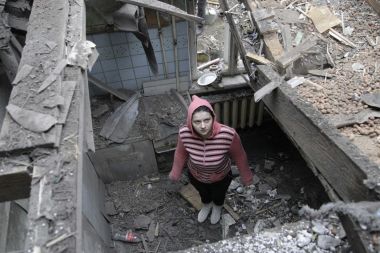Rebels pound Ukraine army positions as peace talks collapse

Separatist rockets streaked across hills in eastern Ukraine on Monday as rebels pounded the positions of Ukrainian government troops holding a strategic rail town, while both sides prepared to mobilise more forces for combat.
US officials said Washington was taking a "fresh look" at providing Ukraine with lethal aid after a surge of violence following the collapse of a new peace effort on Saturday, although they emphasised that no decision had yet been made.
Kiev's military said five more Ukrainian soldiers had been killed in clashes, while municipal authorities in the rebel-controlled city of Donetsk said 15 civilians had been killed by shelling at the weekend.
Talks between Ukraine, Russia and rebel officials in Minsk, Belarus, had raised hopes of a new ceasefire to stem the violence in a conflict that has claimed more than 5,000 lives. But they broke up without progress with Ukraine and the separatists accusing each other of sabotaging the meeting.
Donetsk reverberated to the thud of artillery and mortar fire through the night and several homes were destroyed with at least one civilian death on Monday.
Separatists kept up attacks on Debaltseve, a strategic rail hub to the northeast of Donetsk, in an attempt to dislodge government forces there.
The outskirts of Yenakieve and Vuhlegirsk, both on the main highway to Debaltseve, were under heavy artillery fire as rebel multiple rocket launchers and artillery pummelled the positions of Ukrainian troops in the area.
At one point, a salvo of around three dozen rockets fired from rebel positions screamed across surrounding hills towards Debaltseve. It was followed 15 minutes later by incoming fire from government forces.
"The toughest situation is around Debaltseve where the illegal armed formations are continuing to storm the positions of Ukrainian military," military spokesman Andriy Lutsenko told a briefing. But he said Ukraine's forces in the town were enough to hold it and he denied that government forces were encircled.
According to Kiev officials, January was one of the bloodiest months in eastern Ukraine since the conflict erupted. Regional police spokesman Vyacheslav Abroskin said 112 civilians had been killed by separatist shelling and attacks.
The rebels, in a statement quoted by Russia's RIA Novosti news agency, said 242 civilians had been killed in the month as well as 92 of their number.
GENERAL MOBILISATION
The separatists, who the West says are armed by Russia and supported by several thousand Russian troops, defiantly announced a general mobilisation plan which they said would boost their fighting forces to 100,000 men.
Kiev itself is also pressing ahead with a fourth wave of military call-up aimed at raising an extra 50,000 men.
The Western powers support Kiev's view that a peace deal sealed last September, which included a ceasefire and a commitment for foreign fighters and military equipment to be withdrawn from Ukraine, is the only viable roadmap to ending the conflict.
But the separatists, who have declared their own 'people's republics' and have notched up several military successes since then including taking Donetsk airport from government troops, now appear to want to negotiate a new blueprint.
German Chancellor Angela Merkel appealed for a ceasefire to be urgently restored in Ukraine, under the terms of the Minsk peace plan, and said Germany would not support Kiev's military forces through deliveries of weapons.
The New York Times reported on Sunday Washington was taking a new look at providing Ukrainian forces with defensive weapons and equipment in the face of the rebel offensive.
A senior administration official, speaking on condition of anonymity, confirmed the issue was getting a "fresh look", adding that it was unlikely any decision would be taken until after Secretary of State John Kerry visits Kiev on Thursday.
The separatist rebellion erupted last April after Russia annexed Ukraine's Crimea in response to the ousting of a Moscow-backed president by street protests in Kiev which ushered in a government committed to integration with Europe.
Moscow denies it has any regular troops in Ukraine despite what the West and Kiev say is incontrovertible proof.
In a street on Yenakieve outskirts, a shell landed directly onto a third floor apartment of a nine-storey building, instantly killing a woman and wounding her husband.
"We had to climb across the balcony to evacuate the man and we left her lying in the rubble. She was picked up later by a sanitary team," said Anatoly Pomazanov, 42, who owns a grocery shop in the building.
"It is like this every day. The shelling is incessant. We keep children in cellars. We let them out only during lulls in shelling, for about 30 minutes at most. I want to ask President (Petro) Poroshenko: are we also Ukrainians or simply targets?"
Several residents were seen loading bags in cars and hastily leaving the neighbourhood.
Natalya, 68, who with her daughter lives in an apartment a floor below the one destroyed, was weeping. "Tell me what do I do now? This is all I had, the soldiers are two kilometres away, there are no targets here."
Dmytro Boichuk, 78, a retired miner, said people were already immune to the shelling. "We are numb. We go about our businesses. Someone gets killed, someone gets wounded, but we carry on."











